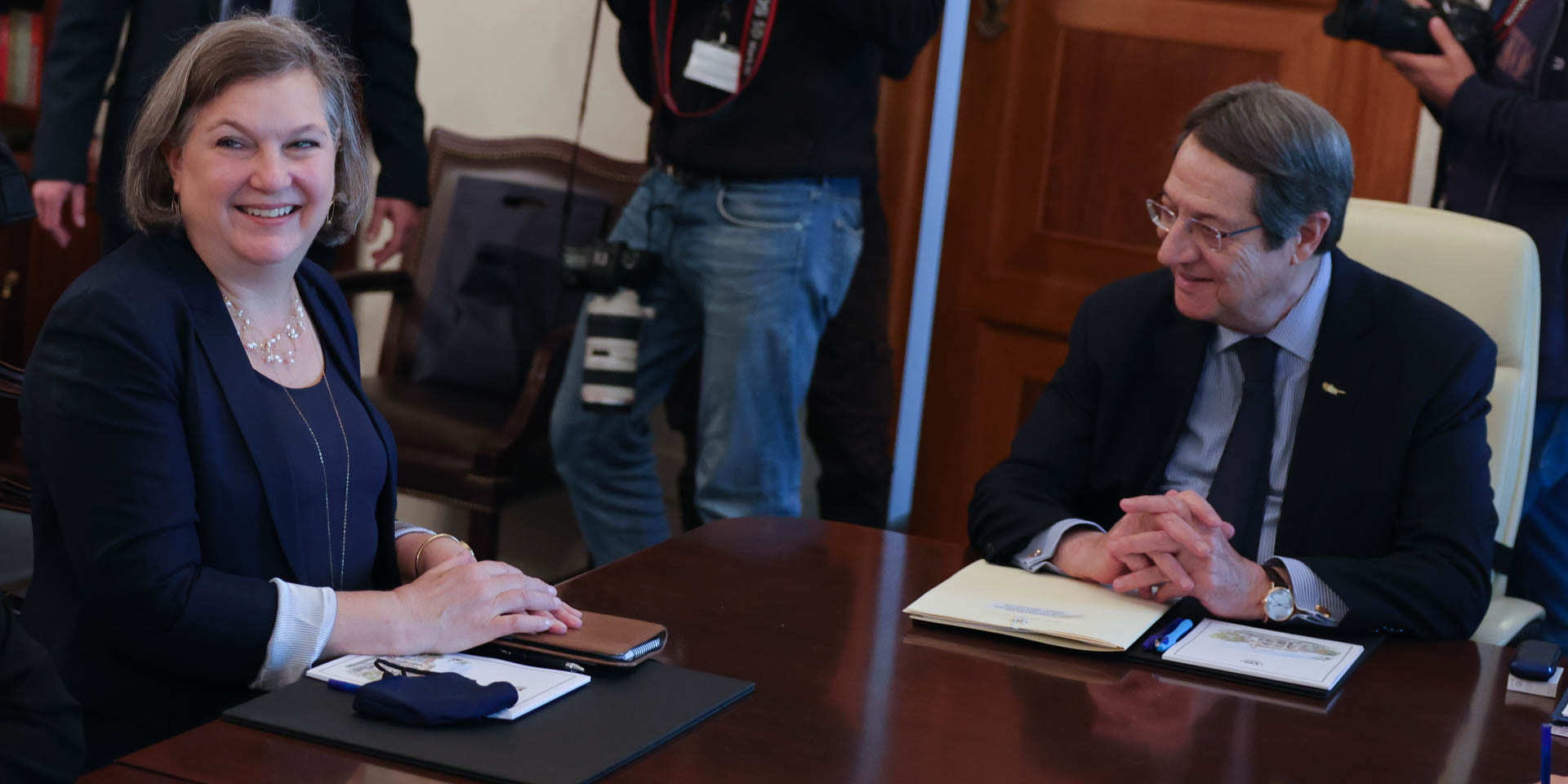US pressure on Cyprus to offer the biggest confidence building measure of them all – energy cooperation with Turkey
A settlement of the Cyprus issue might no longer be a prerequisite for energy cooperation among the countries of the eastern Mediterranean, it emerged during the two-day visit of the US Under Secretary of State Victoria Nuland.
The war in Ukraine has made the ending of dependence on Russian energy a matter of great urgency for the US and the EU which seem determined to make use of natural gas reserves in the eastern Mediterranean, even though quantities are relatively small.
In an interview with Hurriyet newspaper, during her visit to Turkey, Nuland said: “Among the things that this war highlights, is the need for all countries that still have a high amount of imports of oil and gas from Russia in their mix to find ways to diversify and to diversify fast.”
She did not specify in what ways Turkey, which covers some 50 per cent of its gas needs by imports from Russia, would diversify, but spoke about the efforts of Turkey and Israel to normalise relations that could lead to energy cooperation between the two.
There were opportunities in the eastern Mediterranean, some involving Turkey’s close neighbours, some involving new explorations and pipelines, she told Hurriyet. “We particularly want to help Turkey and its goal of diversifying away from Russian dependence,” she added.
Before Nuland’s visit to Cyprus there was speculation that the US would try to kick start the Cyprus talks. Without referring to the visit, Foreign Minister Ioannis Kasoulides told state radio last Monday that the “tectonic changes taking place with regard to international relations, foreign policy and everyone’s role are conducive to the pursuit of a Cyprus settlement.”
Given the big changes taking place in the world, Kasoulides believed that it was time for certain issues, which were considered of “secondary importance by the international community”, to be settled.
These issues “could not be left to get in the way of bigger developments that have to do with the relations of the European Union with Turkey, with the United States and north Atlantic alliance”, he said.
Nuland did not seem too concerned about the Cyprus issue when answering journalists’ questions after meeting President Anastasiades on Thursday, restricting herself to generalities. The US was interested in “hearing perspectives both in the north and in the south”, she said.
The US was always committed to supporting confidence building measures, she said, in reference to Anastasiades’ proposals, “but primarily this is an opportunity to hear whether there are convergences of views we can build on”.
The impression given was that the Cyprus problem could wait, because the priority for the US was energy. Press reports suggested that Ankara was not interested in engaging in
Cyprus problem talks before next year’s elections in Turkey, and this was reportedly conveyed to Anastasiades by Nuland.
Energy cooperation appeared to have been on the agenda of Nuland’s visit to Turkey. “I was in Turkey on Monday and I have the strong sense they too are looking at diversifying energy supplies,” she said on Thursday, and added:
“So, there may be an opportunity in this that we need to develop and continue to talk about…. The idea would be for everybody to benefit because there is a need for alternative supplies of energy everywhere.”
She also repeated the US position on the EastMed pipeline saying the idea of building “a very long pipeline, in very deep water over some 10 years, we believe is too expensive, not economically viable and will take too long.” The EastMed has also been strongly opposed by Turkey as it would exclude it from the energy development of the region.
Asked about Nuland’s view on the EastMed on Friday Anastasiades was defiant. “What we are waiting for is the final report which was financed by the EU. The US does not decide about a European project,” he said.
He also confirmed reports that Nuland “conveyed the need to involve Turkey in the energy developments of the Mediterranean”. His response, he said, was that no-one was preventing Turkey from having a say and a role, provided it agrees on the Economic Exclusion Zone (EEZ) with the Cyprus Republic.
This could be construed as a rejection of energy cooperation with Turkey by the president, although it could also mean plans for the region going ahead without Cyprus. With Turkey and Israel, being pushed by the US to work together on energy (“It is in our interest,” Nuland told Hurriyet), Cyprus could be left out of energy plans if it does not reach an understanding with Turkey.
“There is the possibility of Cyprus being left out from regional energy cooperation,” said Hubert Faustmann, professor of history and political science at the University of Nicosia.
“The war in Ukraine has caused all certainties to go out the window and with everything in chaos there is pressure to act,” said Faustmann, who argued that in the new world environment everyone was talking
“There is pressure for a constructive move, and cooperation,” he said. The possibility of energy cooperation without a settlement of Cyprus problem could not be ruled out, especially if the Cyprus government did not want to miss the energy train.
Government sources indicate that Anastasiades is not very keen on the idea of energy cooperation with Turkey, especially as Nuland hinted at the involvement of the Turkish Cypriot regime.
“We are focused on (energy) projects that can deliver now for Cyprus, both in the south and in the north, for Europe, for all of the countries of this neighbourhood,” she said on Thursday.
Nobody can predict how things will pan out. President Tayyip Erdogan might also reject the idea of working with the Republic, which Turkey does not recognise, and focus instead on pumping gas from Israel’s gas field, assuming he reaches an agreement with Israel.
As for the Republic, Anastasiades could be faced with a big dilemma – cooperate with Turkey and the occupation regime or exclude Cyprus from the regional energy plans being drafted by the US. Neither is an appealing option for him, even though he could sell such a cooperation as a confidence-building measure, which it would be.







Click here to change your cookie preferences